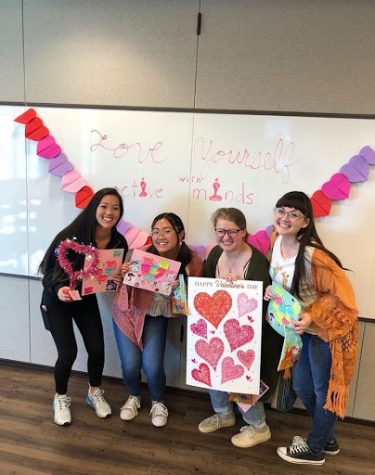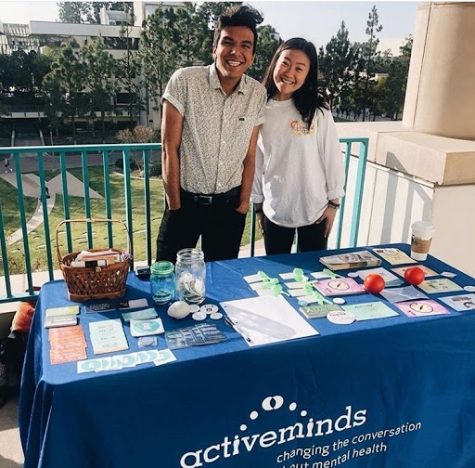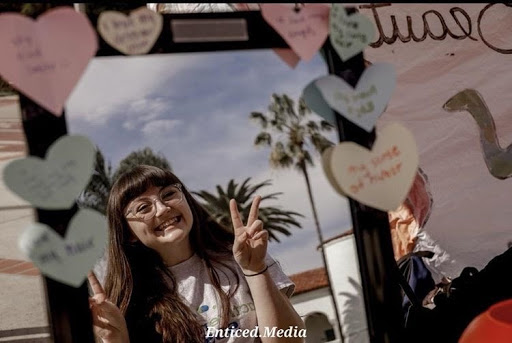In Oct. 2019, San Diego State psychology senior Phoebe Shorter noticed she felt different. Along with her book bag, she carried despair inside and out of the classroom, and a lack of appetite and profound sadness were attached at its hip.
Shorter has depression. However, she did not realize she had it until she joined the Active Minds SDSU, a branch of a national organization working to reduce the stigma behind mental illness, in 2019.
She walked into her first meeting with the intention of helping others find the resources they needed to address their struggles; something that would bring purpose to her life. In that first meeting, Shorter realized she needed help as well.
The first topic covered was about suicide prevention and awareness. In one activity, students paired up and were coached on how to ask someone if they’re struggling with suicidal thoughts.
“I was partnered with my friend, and we were supposed to pretend that we were a student who was struggling,” Shorter said. “When answering the questions, I realized that I wasn’t pretending.”
Until that day, shame and denial prevented Shorter from telling anybody about her suicidal thoughts, but her involvement with Active Minds gave her the push to seek out the help and advice she was giving to other people. She eventually paired up with a therapist at SDSU, found the medication she needed to take and was officially diagnosed in February 2020.

Now, Shorter is a Co-Public Relations Chair at the Active Minds Club and is looking forward to the new semester. However, there will be some changes in how they operate this year due to COVID-19.
The group normally held meetings and outreach events in-person, but will now hold them through Zoom, Active Minds President Kaitlin Chau said.
Active Minds will hold outreach events once to twice a month on Thursdays from 10 a.m. to 2 p.m.
These events target a specific theme surrounding mental health. Some are more light-hearted like the first event of this year, which will focus on coping with stress during COVID-19. Other events involved heavier topics, such as a suicide prevention outreach, which connects with Shorter on a personal level.
However intense they may be, these meetings and events can have lasting impacts on students.
“The things that we learn at the meetings have literally saved lives, like suicide prevention training, and opened up conversations that many students are not used to having,” Active Minds Secretary Brianna Smith said.
This is why the mission of Active Minds remains the same.
It is not to act as a therapy group. They are students who advocate for those who are struggling and have the capability to recognize that they can point them into the direction of available resources on campus.

Despite the pandemic creating some setbacks, their community is continuing to grow.
“We sent out a mass email to all of the students and we have over 100 more emails that were added to our mailing list,” Chau said. “We normally have like 20-25 people who come to the meetings.”
The email list provides links to meetings, resources offered by Counseling and Psychological Services and updates on Active Minds, and can be accessed on the Counseling and Psychological Services website under ‘Get Involved,’ according to Smith.
Currently, CPS is offering virtual counseling services as well as other resources such as applications that help with anxiety and tips on self-care, Smith said. These are the resources Active Minds connects students to if they are struggling with their mental health.
With some of that connection lost because of COVID-19, the group of executives and members at Active Minds are trying their best to maintain and even grow their impact on campus through their social media accounts, which are run by Shorter along with the Co-PR Chair Ennie Marie.
We are partnering with @active_minds in using our voices to make a change. Together we can uplift silenced voices, improve access to spaces for individuals to speak about mental health, and offer resources to oppressed communities. Advocate for change! #YourVoiceIsYourPower pic.twitter.com/ugoBEZkeRb
— SDSU Active Minds (@SDSUActiveMinds) September 1, 2020
Maintaining one’s mental health can often seem isolating and lonely, especially during the COVID-19 pandemic. It can be an experience that can strip someone of their sense of connection to the world around them.
Active Minds hopes to bridge this gap, and make others feel unashamed about what they are thinking or experiencing; To bring that sense of connection back and normalize the experiences of mental illnesses as much as they can through in-depth conversations and virtual events.
Shorter joined Active Minds with that same intention in the midst of all the emotional turmoil she was dealing with.
Since Oct. 2019, Shorter has made progress. She struggles from time to time, but her depression is not debilitating as it used to be.
Although realizing that she needed help as well may seem ironic, Shorter credits Active Minds and their method of destigmatizing mental health through education and conversation. To her, the club is part of who she is. Now, Shorter looks to bring help to others seeking mental health assistance.
“Who would’ve known if I went to a different school if I would’ve gotten the help that I needed,” Shorter said, “Who knows … I’m hoping that what I felt, I can provide to someone else.”







